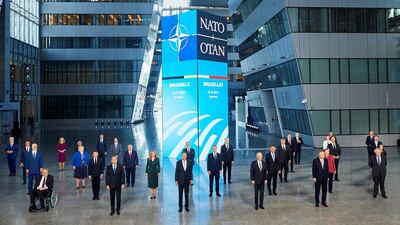Nato presented a united front at its first post-Donald Trump summit, as President Joe Biden demonstrated a renewal of relations with America’s allies at a summit in Brussels.
The alliance was boosted by Mr Biden's affirmation of the mutual defence pact, after Mr Trump openly discussed withdrawal from the organisation. “I just want all of Europe to know that the United States is there,” the president said ahead of the meeting. He added that the US viewed the common defence commitment as a “sacred obligation”.
Nato leaders also reiterated a commitment to continue to “stand with Afghanistan” as Nato’s Secretary General Jens Stoltenberg said that would mean continued training and financial support for Afghan forces and institutions.
Among the “concrete decisions taken in eight key areas”, Mr Stoltenberg said Nato would establish an innovation fund to invest in start-ups working on emerging and disruptive technologies.
China’s was directly included in the Nato communique on Monday. The alliance issued a strong rebuke, stating that country’s actions presented “systemic challenges to the rules-based international order”.
With President Joe Biden providing more backbone than his predecessor, Nato has now decisively toughened its stance against Beijing after many years of restraint.
The communique, backed by all 30 Nato countries, condemned Beijing on several fronts.
“We are concerned by China's coercive policies, which stand in contrast to the fundamental values enshrined in the Washington Treaty,” the alliance said. The North Atlantic Treaty, also referred to as the Washington Treaty, is the treaty that forms the legal basis of Nato.
“China is rapidly expanding its nuclear arsenal with more warheads and a large number of sophisticated delivery systems. It is opaque in implementing its military modernisation. It is co-operating militarily with Russia, including through exercises in the Euro-Atlantic.”
The unrestrained language demonstrates the alliance’s increasing concern over China’s rising power and dominance.
Defence experts also told The National last week of growing concerns over artificial intelligence being used on combat drones.
Mr Stoltenberg said this issue, alongside other advances being exploited by China, would be addressed. “China is investing heavily in new disruptive technologies such as autonomous systems, facial recognition and artificial intelligence and putting them into different weapon systems. That really is changing the nature of warfare in a way that we have perhaps never seen before.”
But the alliance said it would continue to work with China wherever it could, particularly on climate change. “Nato maintains a constructive dialogue with China where possible,” the leaders' statement said.
Boris Johnson, the British prime minister, also used more emollient language, stating that none of the 30 world leaders gathered in Brussels wanted to “sink into a new Cold War with China”.
The Nato communique produced an immediate response from China with its London embassy stating that the message contained “distorted facts” which amounted to slander.
China appears to have supplanted Russia as the main threat to the transatlantic treaty’s security but Moscow’s continued belligerence towards the West, through cyber attacks, assassinations and overseas actions, meant that the relationship with Nato was “at its lowest point since the Cold War,” Mr Stoltenberg said. “Moscow's aggressive actions are a threat to our security.”
But the alliance remains open to dialogue, particularly on the intermediate nuclear weapons treaty. “We would welcome new strategic talks on future arms control,” the secretary general said. “Nato remains committed to our dual track approach of defence and dialogue. We will keep our defences strong, while remaining ready to talk to make our positions clear, avoid misunderstanding and prevent escalation.”
“Russia remains the main problem," Estonian President Egils Levits said. "China is a new challenge, a different challenge, but Nato will counter both.”
President Biden is to meet Russian President Vladimir Putin face-to-face in Geneva on Wednesday and is expected to deliver the strong message in person.


